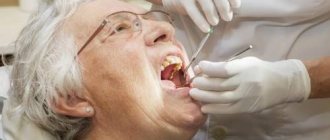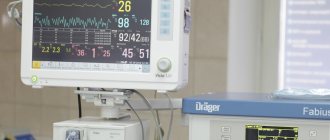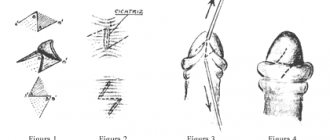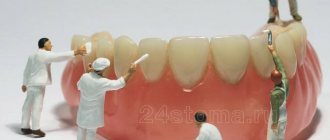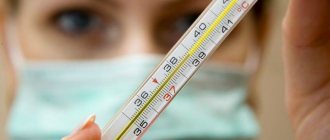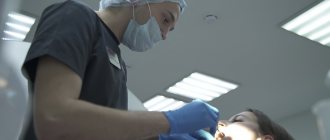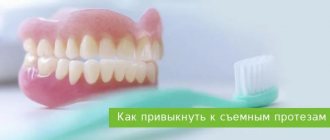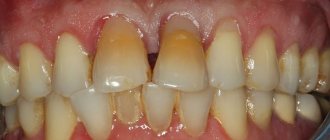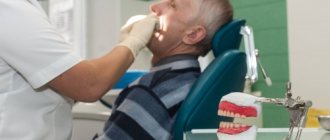Modern dentistry always focuses on avoiding, if possible, surgical intervention and preserving the patient’s natural tooth. One way or another, natural teeth form the correct bite and look quite aesthetically pleasing and harmonious. Unfortunately, it is not always possible to complete the task. Various pathological processes that affect not only the crown of the tooth or its roots, but also the underlying tissues, including bone, often require total tooth extraction using surgical methods. In this case, many patients are concerned about the question of when it is possible to perform prosthetics on an extracted tooth.
.
Some are in no hurry to complete this task, citing one reason or another, but it is worth noting that prosthetics must be performed, first of all, in accordance with the recommendations of the attending physician, who will take into account all factors and advise methods for performing this procedure. This is due both to the anatomy and physiology of occlusion in general, and to the individual characteristics of the patient. Untimely prosthetics can lead to such consequences as:
- aesthetic problems;
- changes in facial features and shape;
- disturbances in the work and functioning of the maxillofacial joint;
- bonding or movement of teeth;
- destruction of healthy teeth;
- digestive problems and more.
After tooth extraction, prosthetics on time
, recommended by your dentist, will help you avoid these and many other problems and keep your teeth.
Implantation
The basis of the implant is a metal pin (titanium) that is installed in the jaw bone and replaces the tooth root. Implantation is used for the loss of one or more teeth or their complete absence. Implants made of metal-ceramic or metal-free ceramics can serve as support for a bridge structure.
The surgery is performed under anesthesia and can last 20-60 minutes. Depending on the specific situation, the implant is installed immediately after the removal of a damaged tooth or into already healed gums. The implantation scheme may vary depending on the need to build up lost bone tissue and gum formation.
The period of fusion of the metal root with bone tissue can take 3-6 months, after which the prosthesis is installed. During the implantation period, the patient can use a temporary crown.
The average service life of an implant is determined by its quality, the level of skill of the specialist, and the individual characteristics of the patient. Subject to medical recommendations - from 15 years to “for life”.
The period of adaptation to prostheses installed on implants can be several hours or 1-2 days.
Care products for implants are the same as for regular teeth:
- toothbrush with toothpaste;
- dental floss;
- rinsing or irrigation.
Twice a year it is necessary to undergo a preventive examination with a dentist. Professional cleaning is carried out as needed.
Terms of treatment and duration of procedures
How quickly the prosthesis is installed depends on the type of orthopedic structure. Thus, temporary dentures can be fixed after 20-30 minutes.
Permanent dentures are placed when the wound heals and the inflammatory process stops, i.e. about three to four weeks from the date of removal. However, prosthetics are required for a maximum of six months, otherwise bone tissue atrophy will then begin and additional sinus lift surgery will be required.
The duration of the procedure also depends on the type of prosthesis used:
- The immediate prosthesis is placed in a few minutes. However, it must be taken into account that it is also necessary to take an impression and then make the structure, which takes at least one day;
- The bridge is installed in no more than two weeks. This period includes the preparation and manufacturing stage of the structure;
- installation of a clasp prosthesis requires about 7-10 days;
- plate structures are installed within 5-10 days;
- The implantation period can range from several days to several months. Everything will depend on the chosen technique.
Removable dentures
A removable denture is a base made of plastic or nylon on which artificial porcelain or plastic teeth are attached. The structure is fixed in the mouth with micro-locks, clasps, telescopic crowns or due to the suction effect. Removable dentures are used for unlimited dental defects and complete absence of teeth.
There are several types of removable dentures based on the type of fastening and base material:
- clasp;
- nylon;
- plastic with silicone gasket;
- plastic partial or complete.
Conventionally, removable clasp dentures are fixed using telescopic crowns, attachments, and clasps. They are used only in cases of partial absence of teeth. It is the most comfortable, functional and durable type of removable dentures.
A soft nylon denture is recommended in partially edentulous cases. Fits well and is easy to use.
Plastic ones with a silicone gasket are also convenient. Dentures of this type adhere more tightly and put less pressure on the gums.
Plastic full or partial are an outdated type of dentures. A budget option, which is the basis of all social programs for free prosthetics. Plastic structures are poorly fixed in the oral cavity and cannot chew solid food well.
"Butterfly"
A removable microprosthesis “butterfly” comes to the rescue when 1-2 teeth are missing. The technique is used to eliminate defects in the frontal area. Its advantages:
- speed - 1-2 visits to the orthodontist;
- no need to grind adjacent teeth;
- high aesthetics;
- low price.
The “butterfly” can be made of metal ceramics, entirely of plastic on a cast frame, or with a metal wire fastening. The technique is not used to restore the dentition on the lateral areas of the jaw, which experience significant stress when chewing food.
The process of prosthetics begins with diagnosing the condition of the teeth, cleaning them from tartar, filling and removing teeth, treating gums and other measures. The period from the time of tooth extraction to the installation of a bridge, clasp or plate prosthesis is from 1 day to 1-2 months.
The technique of one-stage prosthetics is used for:
- absence of inflammatory processes and infections in the oral cavity;
- good condition of gums, teeth, bone tissue.
The general physiological condition of the patient is taken into account.
According to statistics, installation of removable dentures in place of extracted teeth is possible in 1-4 weeks.
It may take from several hours to several weeks to get used to. Not only the skill of the specialist, but also the psychological mood of the patient is of great importance. Pain may not appear immediately. Correction can be carried out no earlier than the next day, provided that the structure is in the mouth for at least 4 hours. Several adjustments may be needed.
In the first days, a speech defect is usually observed, its severity is determined by the degree of bulkiness of the structure. Patience and regular exercise will help you get rid of it in 1-3 days.
The service life of removable dentures is 5-10 years, determined by the condition of the gums and teeth (for clasp dentures).
Caring for removable dentures is similar to caring for living teeth - brushing and rinsing. Removable dentures should always be kept in a damp environment. Using a fixing cream or gel will ensure a tight fit of the structure to the gum and prevent food debris from getting under the denture. For disinfection, special antiseptic agents are used, available in the pharmacy chain.
Even if your teeth are completely missing, regular visits to the dental office are recommended to monitor the condition of the oral mucosa. If there are no problems, you should visit an orthopedic dentist at least once a year. The specialist will assess the condition of the structure and, if necessary, make corrections.
Which dentistry can I order temporary dentures from?
When choosing a clinic, you need to pay attention to its reputation, it is worth taking reviews into account, but the determining criterion for most people is cost. Our dental clinic “Tri Dental” offers a list of services and privileges:
- The experience of doctors and the availability of special equipment allows you to install removable and fixed temporary teeth after extraction at an affordable price;
- short production time (up to 2 days), but it all depends on the complexity of the prosthetics;
- high quality - we use only certified materials that meet sanitary requirements;
- long service life - in most cases, temporary teeth after removal are not worn for more than 6 months, but under certain circumstances the period can be increased several times without harm to health;
- services are provided under a contract, and all procedures are guaranteed!
If you have any questions, you can always contact our specialists for advice by phone.
Fixed dentures
Fixed dentures are rigidly fixed in the oral cavity with cement compounds. They are designed to restore various defects of teeth and dentition. This:
- crowns;
- bridge structures.
Single crowns can restore the anatomical shape of a damaged tooth with preserved stability and root structure. They are made of metals, plastics, ceramics, as well as metal-plastic and metal-ceramics.
Bridge structures are bridges that completely cover the area with missing teeth. The pontic consists of artificial teeth, and the supports are made of crowns that are attached to strong teeth. When chewing food, pressure is evenly distributed throughout the dentition. Bridge structures can be solid metal or combined - metal and plastic, metal and ceramics.
Installation of fixed dentures can be carried out over several visits: grinding of the supporting teeth and making an impression, fitting of the prosthesis, correction of the structure and its fixation.
After tooth extraction, fixed dentures can be installed immediately after the wound has healed - 7-10 days. If the period of preparation for prosthetics takes a long time, the patient is made of temporary dentures for the front part of the dentition.
The less time has passed since the damage/loss of the tooth, the shorter the adaptation period.
The durability and reliability of removable dentures are determined by the general health of the patient and proper care.
Caring for removable structures consists of carrying out the usual activities: brushing your teeth with toothpaste, rinsing your mouth with special compounds. The use of dental floss is not recommended, as there is a risk of damaging the denture attachment. Regular visits to the dentist's office for diagnostic, preventive and therapeutic measures will help preserve the remaining teeth and extend the life of fixed dentures.
Is it possible to replace a tooth immediately after extraction?
Postoperative prosthetics can be performed within 24 hours after removal. Prostheses are made in advance. However, this is a temporary solution to an aesthetic problem. It is suitable if:
- front teeth are lost, as a result of which the patient experiences psychological discomfort;
- several dental units were removed at once;
- edentia is complete;
- 2 extreme antagonists, the chewing surfaces of which are in contact, were removed;
- the last molars were removed from a patient with temporomandibular joint disease;
- the patient is a child, and therefore there is a high risk of jaw deformation.
If there is no urgent need for a prosthesis, installation can be carried out in the first couple of weeks after tooth extraction. However, this is a period when only temporary structures can be installed.
Permanent structures can be installed once the wound has healed. Long-term prosthetics are carried out 3 or more months after removal.
Thus, when choosing an option, there are many nuances to consider. The specialists of the dental complex "PRESIDENT" always approach the selection of prosthetic treatment individually. An experienced dentist will find a solution that is best for you!
General recommendations
During the period of adaptation to dentures, it is recommended to stop eating solid foods and choose softer foods. It is recommended to eat slowly, cutting food into small pieces. You need to chew food on the right and left sides in turn. To restore chewing skills, pear or apple slices are suitable.
It is necessary to completely avoid chewing gum, toffees, toffees and other viscous, sticky products. They can cause disruption of the fixation of the prosthesis, its breakage, and injury to the mucous membrane.
Do not clean dentures with abrasives, alcohol, alkaline or acidic solutions. The use of hard toothbrushes is not recommended. You should not chew candy, nuts, or seeds.
If you have any doubts or need a professional opinion on a problem with your prosthesis, you can contact the Canadian Center for Innovative Technology and Neuromuscular Therapy for a consultation. Our specialists will answer all your questions!
